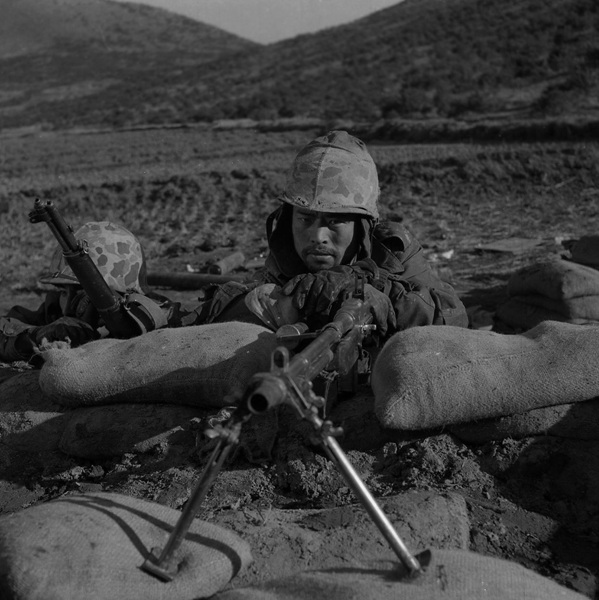[HanCinema's Film Review] "The Marines Who Never Returned" + Full Movie
 By Panos Kotzathanasis | Published on
By Panos Kotzathanasis | Published on
Considered among the most iconic works of prolific Lee Man-hee-I, "The Marines Who Never Returned" is an impressive movie, but also a mashup of elements that highlight his directorial abilities, despite the lack of measure on a number of occasions.
Advertisement
The story focuses on a platoon of marines, who, as the movie begins, are fighting a battle against the North in the ruins of a city. The fighting scene is exquisitely shot, highlighting the budget Lee had in his hands, but the true impact comes when they witness the killing of a woman who tries to run away with her little daughter, and even more so, when they enter a building where they find a number of people hanging from the ceiling along the even more who are lying dead on the floor. One of them happens to be Jeong-ik's (one of the soldiers) sister, in an element that highlights the combination of melodrama and anti-war message that form two of the most central elements of the narrative. Nevertheless, the men decide to "adopt" the little girl, Yeong-hee, who eventually becomes the mascot of the platoon, in a series of sequences that are rather sweet and funny to witness, particularly through their efforts to hide her from their commander, or the fact that she gives funnily derogatory nicknames to everyone. At the same time, some tension does exist between the soldiers, as Choi is the brother of the man who joined the others and ended up killing both the girl's father and Jeong-ik's sister. After a break at a bar of Korean hostesses that is off-limits to Korean men, which does involve some friction, though, the last part deals with the crew facing the People's Volunteer Army in the mountains.
Lee Man-hee-I directs a movie whose elements can be described as contradictory. For example, the anti-war message is rather intense, as the massacre scene, the splitting of brothers to opposing sides, and the finale that cements the title fully. At the same time, the camaraderie of the soldiers, the way they take care of the little girl in a manner that only a family could, and the entertainment they have, mostly through buffoonery, as in the case of the dancing scene, seem to promote actually the Korean Army, and in conjunction, the war itself. The same applies to the ending, which both shows the blights of war in melodramatic terms, but also exemplifies the soldiers who are willing to do their duty even in the face of death.
In another element, the presence of the girl, in a rather memorable performance by Jeon Young-sun, works on a number of levels. Firstly, to humanize the soldiers as something besides killing machines, but also progressing the split brothers arc, and through her fate, intensifying the melodramatic aspect of the movie. The bar scene also moves in the same path, showing that the soldiers can be violent even against women, but at the same time, highlighting that harmony can be achieved when Koreans decide to sit down and talk about their issues, while showing understanding to each other's problems. Lastly, some elements of humor, if somewhat polemic in their nature, also work well within the narrative, with the joke of Stalin proposing killing to be an Olympic game being the most memorable.
The combination of all these elements can be somewhat confusing, as a number of them contradict each other, but at the same time, work quite well in entertainment terms, allowing for a relief from all the battles, while levitating the movie into something more than a war film.
Regarding the last aspect, however, it is actually the one that steals the show, with the Hollywood-like, western-styled manner they are shot being truly magnificent to watch, with DP Seo Jeong-min making full use of the various locations and Lee highlighting his ability to direct many people at the same time. Kim Hee-su's editing also works excellently in that regard, giving a rather fast pace to the battle sequence, which definitely benefits the entertainment they offer. The presentation of the training and life in the barracks and tents is also quite realistic, showcasing, once more, the big budget Lee had in his hands, as much as the work done in the set design.
"The Marines Who Never Returned" may not be exactly clear in its message, but is impressive, fun, and a rather interesting war film, particularly because it avoids most of the cliches of the category.
Review by Panos Kotzathanasis
___________
"The Marines Who Never Returned" is directed by Lee Man-hee-I, and features Jang Dong-hwi, Choi Moo-ryong, Koo Bong-seo, Lee Dae-yub, Jeon Gye-hyeon, Gang Mi-ae. Release date in Korea: 1963/04/11.
 Panos Kotzathanasis
Panos Kotzathanasis
Panos Kotzathanasis is a film critic and reviewer specialising in East Asian Cinema. He is the founder of Asian Film Vault, administrator of Asian Movie Pulse and also writes for Taste of Cinema, Eastern Kicks, China Policy Institute and Filmboy. You can follow him on Twitter and Facebook. Panos Kotzathanasis can be contacted via sinkazama82@gmail.com.


